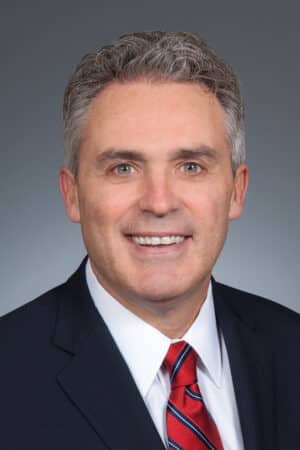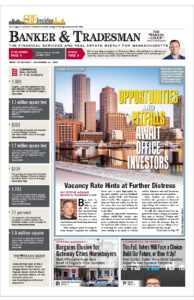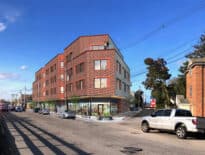James Rooney
President and CEO, Greater Boston Chamber of Commerce
Age: 67
Industry experience: 40 years
As Boston’s economy adapts to the post-pandemic working and living environment, James Rooney has been an outspoken critic of the MBTA’s performance and the effects on the region’s economic competitiveness. The Greater Boston Chamber of Commerce CEO has been critical of some of Mayor Michelle Wu’s fiscal policies and how they could place additional burdens on the business community and its 1,210 members, but he says he’s not interested in running for office.
In a prior role, Rooney spent 12 years as executive director of the Massachusetts Convention Center Authority as it developed and launched the Boston Convention and Exhibition Center in the early days of the Seaport building boom. In July, Rooney was named chair of the Association of Chamber of Commerce Executives’ board of directors. The group represents more than 1,600 business groups, providing professional development and online education for their 1.2 million member businesses.
Q: What unfinished business would you like to see the state Legislature take up in the informal session?
A: Clearly the economic development bill. That was disappointing for everybody in the business community but also throughout the commonwealth. Clearly, targeting funding that continues our leadership in life sciences and biotech, and funding for a new growth industry in climate tech, are nice big plays that we support. That would be our top priority.
Q: Some recent brokerage research indicates that office leasing in the suburbs is outpacing downtown Boston. What are the factors contributing to that trend?
A: Months ago I was saying that for the downtown commercial real estate to rebuild itself and find its new water level, it would take five years. More recently, I’m thinking it might take 10 years for that to take place. And by the way, this is not just Boston. I’m hearing it from chamber leaders around the country: Their downtown commercial real estate industry is going through a transition and in some places, it’s reached crisis levels. It doesn’t surprise me that there is some suburban activity going on. It is related to transportation in a sense that companies, especially if they’re creating outposts, might site them in a place that’s easier to get to.
On top of that, the lease occupancy is one thing, but people in the offices is another. Our offices are right in the Financial District, so we’re able to observe the vibrancy and you can see it. Monday is one level, and Friday is probably the lowest in terms of people coming in. When I talk to members about getting people back to work, the biggest blowback they get from employees is mobility: either congestion or the reliability of the T.
Q: What else can Boston do to move the needle on office-to-residential conversions?
A: Some of our inventory is just purpose-built and doesn’t lend itself well to conversions. There was a study that identified Boston as the least likely for that [tax incentive] program to succeed, given the type of office building inventory we have. It’s worth doing. I support it. However, I don’t think it’s going to be a big impactful initiative as it relates to the downtown office market. Boston’s commercial office building inventory is wildly disproportionate to what exists in other cities. Even in Back Bay, there’s a good mix of office and residential. The Seaport has developed in a mixed-use fashion.
I think as a matter of public policy, government – whether it’s an authority like Massport of the city or the state – needs to create or facilitate residential development. We have a housing crisis and to me, it’s simple market factors. There are proposals for residential projects and government needs to get out of the way and accelerate them.
Q: How can Massachusetts address the high cost of living and how it depresses business growth?
A: You’ve got to take that elephant and break it into bite-sized pieces. Some are national phenomena: gas prices, food prices. We’ve long been a high-cost energy state, and on that score, we can accelerate the economic development bill and investments in climate technology and other sources. It’s going to take some time. Up until now, we’ve been a consumer not a producer of energy. We can be a producer of energy with offshore wind and that will affect the region’s long-term energy costs. On the housing front, we need more inventory. There’s low-hanging fruit in the 40,000 units of public housing that are out of inventory, and we need to accelerate getting those back on the books. I’m pleased to see the big housing bond bill got signed. Unfortunately, it took us years to get here.
Q: As a member of the Healey administration’s Transportation Funding Task Force, are you finding any consensus on the long-term financial plan for the MBTA?
A: I suspect the way this is going to end is that there will be a focus on stabilizing the T and its funding needs for the short term. They are facing financial cliffs that are definable and predictable. Any of the long-term interventions that people suggested, like tolling and congestion pricing, anywhere you look around the world it’s taken eight to 12 years to implement. That’s not going to solve the fiscal cliff of the T next year.
There’s a lot of energy around how we stabilize the patients for the next few years while we do a deeper dive of the analysis necessary to support a long-term reliable sustainable funding stream for not just operations but continued growth of the systems over the next quarter-century or longer. The task force will segment their thinking in those ways. You asked about the T specifically, but we need a more holistic approach to mobility statewide: roads, bridges, the regional transit authorities. Boston’s continued economic success depends upon the rest of the state. We are the economic engine but we need other parts of the state thriving to grow.
Q: Have you been approached by business interests and others dissatisfied with Mayor Wu’s performance?
A: Boy, [Communications Director] Casey [Baines] is kicking me under the table here. I want to be diplomatic. I’ve seen this during [the administrations of former mayors] Flynn, Menino and Walsh where people who feel like the mayor is not exactly leaning into the things they think are important within the city, and Wu is no different in that respect. Yes, I hear from them. It’s my job to listen to people and hear them out. The recent commercial property tax [split] issue made that boil a little bit.
But on the other hand when I meet with my members, universal praise for Boston as a safe city. My members are well-traveled so they are able to put things in perspective. They see some of the dynamics going on in the streets of other cities and crime rates. If there’s one issue that they feel very strongly about it, it’s that. It’s a safe city. But for that, would we have a much bigger problem than we have. I have admittedly been approached and toyed with the idea over the decades, and I’ve been quite successful in finding a platform that enables me to make a difference in a city and a state that I love.
Rooney’s Five Favorite MBTA Stations:
- Broadway
- Park Street
- South Station
- North Station
- Longwood







